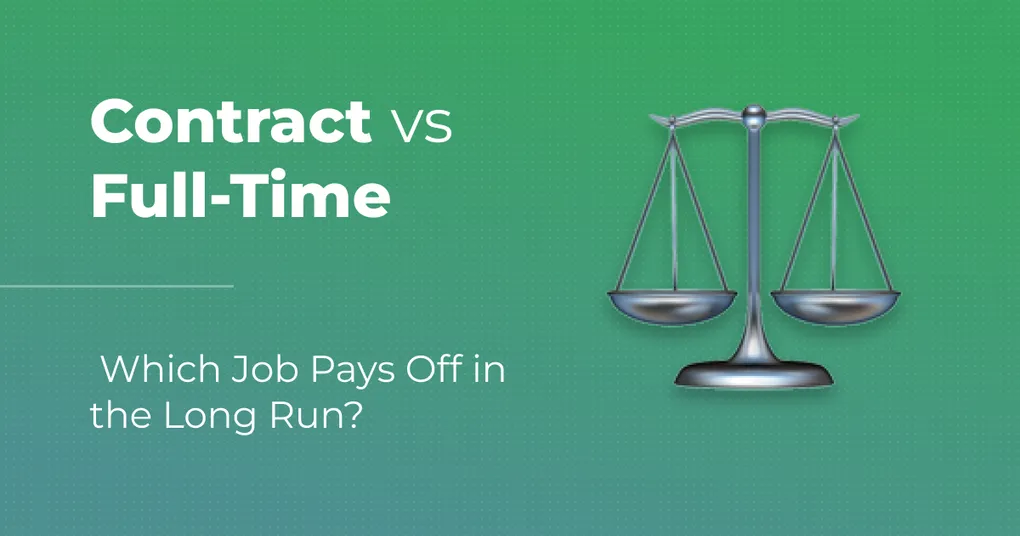
If you’re weighing job offers, one of the biggest decisions you may face is whether to take a full-time role with benefits or a contract position with higher hourly pay.
On Reddit and across job forums, this debate comes up constantly:
- “Is contract work worth it?”
- “Will I make more as a contractor or a full-time employee?”
- “What about job security and benefits?”
The answer isn’t always straightforward. It depends on your goals, lifestyle, and how you value things like health insurance, PTO, and retirement contributions.
In this guide, we’ll break down:
- How contractor and full-time pay compare
- What benefits you miss (or gain) as a contractor
- Tax and legal considerations
- Long-term career impacts
- How to calculate which one leaves you ahead financially
The Basics: Contractor vs Full-Time
Full-Time Employee (FTE):
- Fixed salary or hourly wage
- Benefits package (health insurance, PTO, retirement match)
- More job security and legal protections
- Taxes withheld automatically
Contractor (1099 / Independent):
- Paid hourly or per project, often at a higher rate
- No employer-sponsored benefits
- Responsible for own taxes (self-employment tax)
- Flexibility to choose projects and clients
Pay Differences
Contractors are usually paid more per hour to make up for the lack of benefits and job security.
Example:
- Full-Time Role: $100,000/year salary
- Contract Role: $60/hour (~$124,800/year if 40 hrs/week, 52 weeks)
At first glance, the contract looks better — but that ignores the hidden costs.
The Hidden Costs of Contract Work
-
Health Insurance
- Contractors must buy their own. For a family plan, this can be $12,000–$20,000 per year.
-
PTO (Paid Time Off)
- Contractors don’t get paid vacations. If you take 3 weeks off, that’s ~120 hours of lost income.
- Want to know how much PTO is really worth? Read our guide on The Real Value of PTO.
-
Retirement Contributions
- Full-time jobs often include a 401k match (worth thousands). Contractors must fund retirement entirely on their own.
-
Self-Employment Tax
- Contractors pay both employer and employee sides of Social Security/Medicare (15.3% total).
-
Job Security
- Contracts can end abruptly. Full-time roles often provide more stability.
Benefits of Contract Work
- Higher Gross Pay: Even after costs, some contractors still come out ahead.
- Flexibility: Ability to choose projects and time off.
- Potential Tax Deductions: Home office, equipment, travel.
- Skill Growth: Exposure to different industries and projects.
Long-Term Considerations
- Contractors may earn more short term but have less stability.
- Full-time employees often build longer-term wealth via 401k matches, consistent raises, and promotions. (For tips on boosting your income within a job, see our guide on How to Get a Raise).
- Career trajectory: FTEs may find it easier to climb ladders within a company, while contractors often build breadth of experience.
Quick Comparison Table
| Factor | Full-Time Employee | Contractor |
|---|---|---|
| Salary/Hourly | Lower | Higher |
| Health Insurance | Usually covered | Self-pay |
| PTO | Paid | Unpaid |
| Retirement | Employer match | Self-funded |
| Taxes | Withheld | Self-managed |
| Stability | Higher | Lower |
| Flexibility | Lower | Higher |
How to Decide
Ask yourself:
- Do I value stability and benefits, or flexibility and cash flow?
- Am I prepared to manage my own taxes and benefits?
- Will higher gross pay really outweigh the lost perks?
To answer the last question, plug both offers into JobForager. Our app helps you calculate true total compensation, factoring in insurance, PTO, taxes, and benefits so you can see the real numbers.
Final Thoughts
There’s no universal winner in the contract vs full-time debate. Contractors may earn more in the short run, but benefits and long-term stability often make full-time roles more valuable.
The key is to run the math, understand your priorities, and choose the option that aligns with your career and lifestyle goals.
Happy job hunting,
The JobForager Team